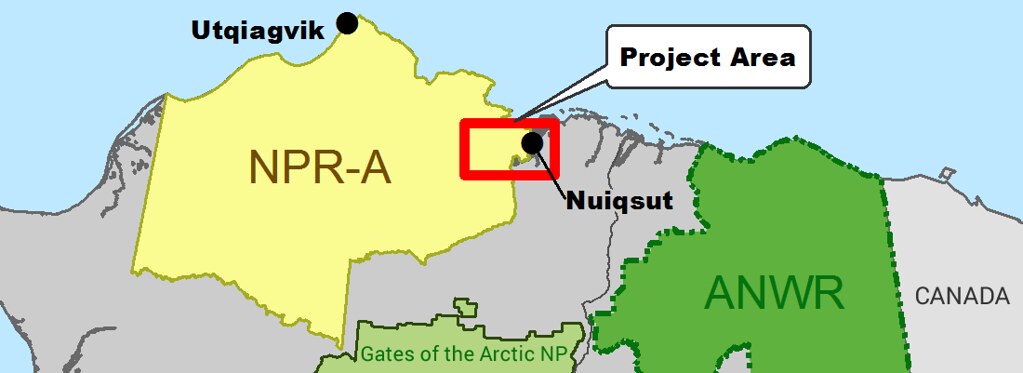美國總統拜登(Joe Biden)3月13日批准「柳樹計畫」(Willow Project),允許能源巨頭康菲石油公司(ConocoPhillips)在阿拉斯加的國家石油儲備區開採石油,美國五大環保團體批這項開發所做的環境評估並未充分考量對氣候的衝擊,決定聯合提告。此外,阿拉斯加在地居民與原住民團體等六個團體也共同提起訴訟。

五大環團分別是美國非營利組織生物多樣性中心(Center for Biological Diversity)、野生物保護者( Defenders of Wildlife)、地球之友(Friends of the Earth)、美國綠色和平組織(Greenpeace USA)和自然資源保護協會(Natural Resources Defense Council)。他們表示,這項石油開採計畫會在未來30年產出約2.6億公噸的碳排,相當於70座燃煤電廠一年排出的二氧化碳。
原告指出,柳樹計畫會對環境、北極的野生生物,以及依賴土地為生的當地居民造成無法彌補的傷害。

這五個環保團體總會員超過1000萬人。他們表示,柳樹計畫每天最高可生產18萬桶原油。燃燒這些石油會加劇氣候變遷,而且違背了拜登的氣候政策。拜登曾承諾2030年前要將美國溫室氣體排放量減半,並且轉型到潔淨能源。
康菲石油和支持者則認為,開發計畫可減少美國對外國的能源依賴,還可創造數千個就業機會,並為聯邦政府、阿拉斯加州和北坡自治地區(North Slope)帶來170億美元的收入。
阿拉斯加的三名國會代表均支持柳樹計畫,他們分別是共和黨籍參議員穆考斯基(Lisa Murkowski)與蘇利文(Dan Sullivan)、民主黨眾議員佩爾托拉(Mary Peltola)。阿拉斯加的州議會也全數投票同意開發。
這是美國內政部土地管理局(BLM)第二次批准柳樹計畫。第一次是在2020年,前總統川普(Donald Trump)的共和黨政府批准開發。
當時,環保組織和阿拉斯加原住民聯合告上聯邦法院。法院於2021年以不合法(unlawful)為由駁回政府的批准案,並要求土地管理局要重新評估氣候影響、思考其他可減輕衝擊的替代方案。
原告團體指出,拜登政府這次的批准依舊沒有遵循法官指示,所提的環境評估並未完整考量氣候影響。
拜登批准的開發項目包括三處鑽油平台、碎石道路、一座中央處理設施、運維中心、簡易的飛機起降跑道、以及數百英里的冰上道路。他也批准在北極的重要和敏感地區特謝普克湖(Teshekpuk)特區進行鑽探和道路開發。

另一場由阿拉斯加居民跟原民團體共同提出的訴訟則指出,柳樹計畫會造成北極暖化,直接危及北極熊。交給法院的文件上寫道,「氣候變遷導致海冰減少,母熊跑到陸地建造巢穴的比例顯著增加。北極熊的生活與棲地需求離不開海冰,海冰融化對牠們造成很大的影響。南波弗特海(Southern Beaufort Sea)族群自1990年代以來已經急劇下降,生存岌岌可危。」
Warning that the U.S. government’s environmental review fails to account for the full climate impact of oil development in Alaska, five of America’s largest conservation groups have filed a lawsuit to stop ConocoPhillips’ Willow oil project in the National Petroleum Reserve – Alaska, which the Biden Administration approved Monday. In a separate lawsuit, six Alaskan and national conservation and Indigenous groups asserted a similar legal challenge.
Center for Biological Diversity, Defenders of Wildlife, Friends of the Earth, Greenpeace USA, and the Natural Resources Defense Council object to the oil extraction project because it will “add about 260 million metric tons of carbon emissions into the atmosphere over the next 30 years – the equivalent of nearly 70 coal-fired power plants operating for a year.”
The plaintiff groups argue that the project would cause irreparable harm to the environment, Arctic wildlife and nearby people who depend on the land for subsistence.
On behalf of their more than 10 million members, the five groups argue that opening up this fossil fuel reservoir and burning the 180,000 barrels of oil per day the Willow project is expected to produce at its peak, will intensify climate change and undermine President Joe Biden’s own promises to halve U.S. greenhouse gas emissions by 2030 and transition the country to clean energy.
ConocoPhillips and other supporters of the drilling argue it will decrease American dependence on foreign energy supplies, create thousands of jobs, and deliver up to $17 billion in new revenue to the federal government, the State of Alaska and North Slope Borough communities.
Supporters of the Willow project include all three members of the Alaska congressional delegation: Senators Lisa Murkowski and Dan Sullivan, both Republicans, and Representative Mary Peltola, a Democrat, as well as the Alaska State Legislature by unanimous vote.
This is the second time the Bureau of Land Management, BLM, has approved the Willow project. The Republican administration of former President Donald Trump first greenlighted the project in 2020.
Conservation and Alaska Indigenous groups challenged that approval in federal court, and the court rejected it as unlawful in 2021. The judge instructed BLM to reassess the project’s full climate impacts and consider alternatives that would lessen its overall impacts.
The plaintiff groups argue that in approving Willow for the second time, the Biden Administration has failed to heed the judge’s instructions, instead producing an environmental analysis that again fails to consider the project’s impacts on climate.
As approved, the project includes three drill sites, gravel roads, a central processing facility, an operations center, an air strip, hundreds of miles of ice roads. It allows drilling and roads in the Teshekpuk Lake special area, one of the most important and sensitive areas in the Arctic.
The Indigenous and Alaskan lawsuit maintains that the Willow project’s effect on the climate of the rapidly warming Arctic directly harms polar bears. “The proportion of females denning on land has increased significantly as sea ice diminishes due to climate change. Polar bears are particularly vulnerable to sea ice melt given their life history and specialized habitat needs. The Southern Beaufort Sea (SBS) population is among the most imperiled polar bear populations in the world, having declined dramatically since the 1990s,” the groups point out in their court filing.
※ 全文及圖片詳見:ENS







